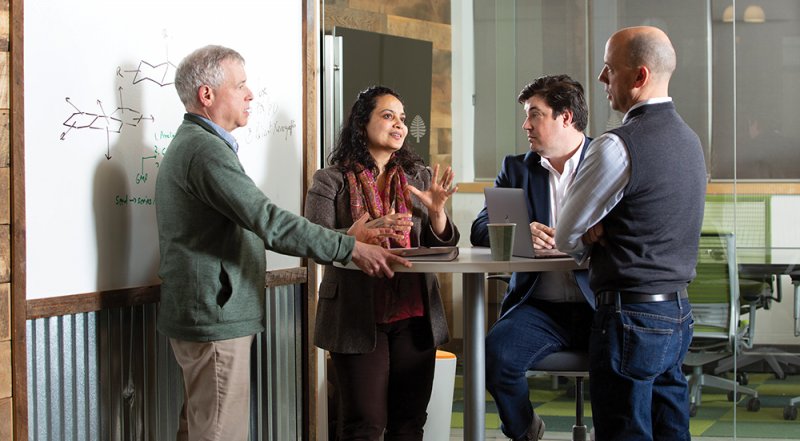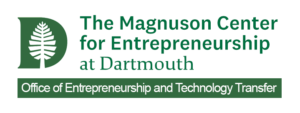Dartmouth Launches Entrepreneurship Accelerator
Dartmouth Launches Entrepreneurship Accelerator
Business NH Magazine
Published Wednesday Jan 6, 2021
Author Matthew J. Mowry

In February 2020, Immunologist Arti Gaur, PhD, second from left, and chemist Glenn Micalizio, PhD, far right, met with Barry Schweitzer, PhD, far left, of the Technology Transfer Office and Jamie Coughlin, second from right, of the Magnuson Center for Entrepreneurship to discuss a new therapy for brain cancer. Courtesy photo.
A new accelerator is aimed at providing entrepreneurial guidance to cancer researchers at the Geisel School of Medicine at Dartmouth College in Hanover and the Norris Cotton Cancer Center at Dartmouth-Hitchcock in Lebanon. The idea is to facilitate bringing new cancer treatments to market and to foster biomedical entrepreneurship.
“The best, most efficient way for us to bring Dartmouth’s biomedical discoveries to cancer patients around the world is through entrepreneurship,” says Steven Leach, the Preston T. and Virginia R. Kelsey Professor at the Geisel School of Medicine and director of the Norris Cotton Cancer Center.
Dubbed the Dartmouth Innovations Accelerator for Cancer, the program just received $1.4 million in investment from five Dartmouth College alumni and health care investors.
“For many of our investigators, there is a gulf between transformative discoveries and interacting with those who can bring those discoveries to market,” says Leach. He calls it “the valley of death” when great ideas fail because there is no connection to resources.
The accelerator, which has been in development for one year, is also partnering with Dartmouth’s Magnuson Center for Entrepreneurship and has a goal to raise $15 million by 2022 in order to create a sustainable program.
In the program, biomedical research teams will pitch their ideas to a panel of local and national biotech leaders and venture capital investors who will select the most commercially promising projects. “It is valuable to develop a diverse portfolio of projects,” Leach says. “You never know where the next transformative discovery will come from.” He says he expects 10 to 20 proposals for the first round of investment.
Those seeding the first year of operations are Todd Sisitsky, managing partner at the investment firm TPG Global; Hoyoung Huh, founder of the Healthcare & Humanity Foundation; Ross Jaffe, co-founder and managing director of Versant Ventures; Stephen Bloch, CEO of EvolveImmune Therapeutics and general partner of Canaan Partners; and Steven Rodgers, head of health care investing for Morgan Stanley Capital Partners.
The accelerator will also be a mechanism for building a community of mentorship and innovation, Leach says. “Even projects not selected have the opportunity to make a pitch, get expert feedback and form relationships with those on the advisory board and achieve mentorship about how to make a pitch in the future and optimize commercialization potential of their discoveries”.
The accelerator builds on three decades of entrepreneurial successes at the cancer center. The oldest and most successful cancer center spinoff is Medarex, which developed the first approved immunotherapies for cancer and was purchased by Bristol Myers Squibb in 2009. Royalties from the sale of Medarex continue to benefit Dartmouth researchers in the form of grants. Fourteen startups have their roots in the cancer center.

